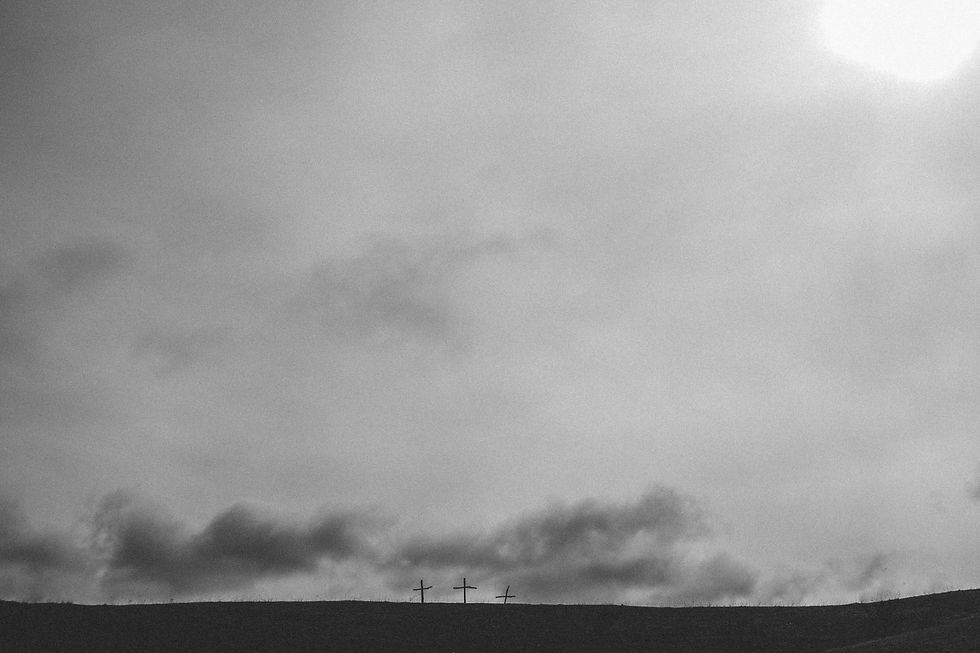Pausing to Lament
- Christ Redeemer

- Apr 5, 2020
- 3 min read
Updated: Aug 11, 2021
By: Jon Morgan

We Christians love Easter and rightly so. It is one of the most joyous celebrations on our calendar. It is the culmination of the Incarnation, the security of our salvation. Easter is ultimate victory over death. It is what J.R.R. Tolkien calls a "eucastrophe" or what Sally Lloyd-Jones refers to as, "the fulfillment of God’s secret rescue plan where he makes all sad things become untrue." Easter is wonderful, and we should love it. But because it is so great, there is a tendency to rush through all of Holy Week to get to the celebration at the end, and when we do this, we lose something important.
Good Friday is the antithesis to Easter. It is somber. It is heavy. It is a day of lament. American Evangelicals tend to have a difficult time with lament. Because our faith is secured and hope fulfilled, the anguish of lament does not often come easy to us. Many times when we read the Psalms of lament, we get squirmy. The raw emotion and almost accusatory tone the psalmists use toward God makes us uncomfortable.
As unbelievable as the joys of Easter are, the sorrows of Good Friday are equally immense. This is the day that the hopes of the followers of Jesus came crashing down. It was just the previous Sunday that Jesus had triumphantly entered Jerusalem to cries of "Hosannah!". They were certain that Messiah had come to sit on the throne of David, to cast out their Roman oppressors, that he would begin his reign on Earth.
But Good Friday brought these hopes to an end. How could there be hope when one of Jesus’ inner circle betrayed him? How could there be hope when Jesus meekly submitted to arrest and torture, when the civil authority knowingly sent an innocent man to death, when the Messiah was executed as a common criminal, among common criminals? For the followers of Jesus, hope was extinguished, and they fled.
Good Friday is the day that Jesus took up the cup that he had prayed earnestly to pass. It is the day that he willingly submitted to the Father. It is the day that he who knew no sin became sin for us. It is when the Son was forsaken by the Father. It is the day that the Son of Man was laid into a borrowed tomb.
We need to not be in such a rush to celebrate Easter that we pass over this day. We need to be somber. We need to let the seriousness of our sin resonate in our spirits. We need to lament.
It may be easier for us to lament these days. Our lives have been altered dramatically in recent weeks. We see the physical and economic suffering around the world and our hearts cry out to God for mercy. On Sunday, our church buildings are empty, and we know that this is wrong. So we cry out to God. We beseech. We intercede. We lament.
We pause, and we lament because we know the darkness of Friday night is soon replaced with the light of Sunday morning. The celebration of the victory of Easter becomes sweeter after the lament of Good Friday. “And you were dead … but God being rich in mercy … made us alive together with Christ,” (Ephesians 2:4-5). We lament the price God paid for our redemption on Good Friday and then rejoice fully on Easter with the victory he secured. Then we can sing with fresh joy and wonder, “Amazing love! How can it be, that thou, my God shouldst die for me?” (And Can It Be, by Charles Wesley).
This will be a Holy Week unlike any most of us have experienced. We will not gather physically as we long to. Our rhythms of this holiday have been disrupted, and we will most likely feel the pangs of separation acutely. On Easter Sunday, our church buildings will be empty and silent, and it will grieve us. Still, we will celebrate and worship. We will offer our thanks and praise to the one who has secured our redemption and adopted us as his own. We will rest in the knowledge that the words of God are trustworthy and true and that the gates of hell cannot prevail over his church. Our church buildings may now be empty, but thank God, so is the tomb.
Photo by Dylan McLeod on Unsplash


Comments